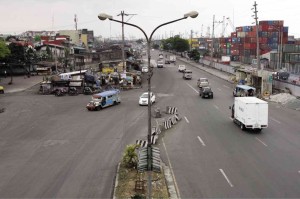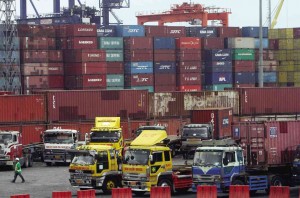Truckers hit Manila’s ‘abusive towing’

TRAFFIC is significantly lighter on Road 10 in Manila’s Port Area on Wednesday the third day of implementation of the city’s expanded truck ban. PHOTO BY NIÑO JESUS ORBETA
Members of trucking groups protesting the daytime truck ban being enforced by the Manila City government have added the use of tow trucks to their growing list of complaints.
“Stop abusive towing” and “Ang towing sa inyo ay negosyo, sa amin perwisyo (Towing is a business for you but a nuisance to us)” were among the messages written on placards posted by members of the Integrated North Harbor Truckers Association (INHTA) and the Alliance of Concerned Truck Owners and Organizations (ACTOO) in front of the gates of the Port of Manila.
The windshields of two tow trucks were smashed on Wednesday although the truckers groups said they had nothing to do with the incidents.
As part of the truck ban being implemented by the city government, trucks caught plying Manila’s streets outside the allowed hours will be towed. Since Monday, the first day the new policy took effect, the Manila Traffic and Parking Bureau has towed 64 trucks.
INHTA and ACTOO members are on the third day of a self-declared “truck holiday” to show their opposition to the city government’s expanded truck ban.
Article continues after this advertisementAt press time, the trucking groups were in a meeting with Philippine Ports Authority officials to find ways to end the ongoing strike which, according to the Bureau of Customs, has adversely affected revenue collections and businesses.
Article continues after this advertisement“The fees are exorbitant; P5,000 for towing and P5,000 for [violating] the truck ban,” James Go, a member of INHTA, said. He pointed out that under the truck ban being enforced by the Metropolitan Manila Development Authority (MMDA), violators are fined just P500.
Go, however, said that they were determined to continue their strike indefinitely until the city government relents and reimposes the old truck ban which would ban them from the city’s streets from 6 a.m. to 10 a.m. and from 5 p.m. to 10 p.m.
Right now, trucks are barred from plying their routes in Manila from 5 a.m. to 10 a.m. and from 3 p.m. to 9 p.m. Mayor Joseph Estrada said the move was for the good of the majority as it would reduce heavy traffic in the city.
Chief Insp. Olivia Sagaysay, head of the Manila Police District’s Traffic Enforcement Unit, said she had recommended the groups’ dispersal on Tuesday.
“What are they still protesting about—the two hours [in the afternoon] that they won’t be allowed out in the streets? But in exchange, we have allowed them to pass through Roxas Boulevard,” she added.
Sagaysay, however, noted that the truckers were not keen on following the traffic enforcers’ instructions for them to stay on the leftmost side of the thoroughfare. “But we’re

The new traffic measure went into effect despite strong opposition from business groups whose cargo haulers were rendered idle at North Harbor. PHOTO BY NIÑO JESUS ORBETA
implementing it to instill discipline and out of consideration for small vehicles,” she said.
She added: “The use of tow trucks has become an issue. But without those, we wouldn’t be able to enforce discipline.”
Meanwhile, the Department of Labor and Employment (DOLE) said on Wednesday it would convene the Bus Transport Industry Tripartite Council (ITC) to determine if the truck ban in Manila could lead to the displacement of workers in the trucking industry.
Labor Secretary Rosalinda Baldoz said she had ordered the DOLE National Capital Region office to expand the coverage of the Bus Transport ITC to include truck companies, including representatives of truck drivers, truck helpers and their employers.
In a statement, Baldoz said that any local ordinance aimed at solving the traffic problem in an area should not lead to workers being displaced. With Tina G. Santos